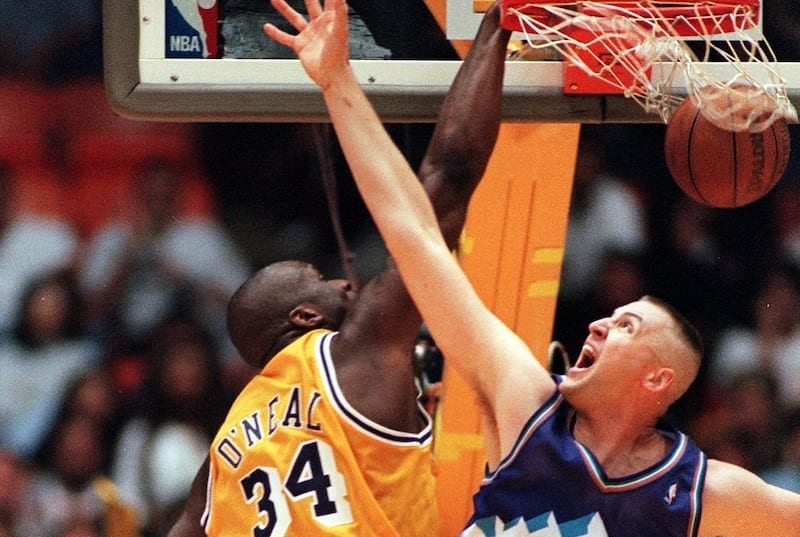The concept of “Super Teams” didn’t exist before 2010, but this exercise has us retroactively applying it to teams in the past, particularly to the NBA’s modern-day era beginning in the late ’70s and early ’80s.
Our criteria stands with at least three Hall-of-Fame level players or other significant contributors joined on a single squad that dominates the league for a stretch and culminates in at least one NBA Championship. Using data provided by Betway NBA, we pick out some of the most dominant over this period.
Philadelphia 76ers 1977-1985
Along with the Los Angeles Lakers and the Boston Celtics, the Philadelphia 76’ers were amongst three teams that dominated the NBA through the ’80s.
The Sixers entered the decade with a bang, having won Championships in 1977 and 1980. The first with Julius Irving, George McGinnis, young gun Llyod (World B.) Free, and the straight from High School Darryl “Chocolate Thunder” Dawkins, and the second after adding Maurice Cheeks and Bobby Jones. They’d win again in 1982 after adding Andrew Toney to the mix but would fall a year later despite signing free agent Moses Malone in the off season.
They reached the conference finals in 1985 but seemed to age out with the retirement of Irving in 1987 and would not see a finals appearance again until 2001 with an entirely new cast of characters.
Los Angeles Lakers 1980-1991
The ’80s were Showtime with the original “Big Three” of Kareem Abdul Jabbar, Magic Johnson, and James Worthy.
Drafting Johnson 1st overall out of Michigan State in the 1979 NBA Draft was the spark that set a decade of dominance in motion. Johnson led Los Angeles to a championship in his rookie season, winning the NBA Finals MVP along the way. They’d win again in 1982, and if that wasn’t enough, managed to score the first overall pick in that year’s draft from Cleveland.
That pick would turn into “Big Game” James Worthy, who would help them reach the finals 7 of the next 9 seasons, including championships in 1985, 1987, and 1988. The team would stay competitive through the next decade, but wouldn’t again see the dominance that they did through the ’80s.
Boston Celtics 1980-1988
The Lakers were not alone in their ’80s dominance. The Boston Celtics won three championships during the decade despite falling the Lakers in two hard-fought championship series.
Just as the drafting of Magic Johnson sparked the Lakers, drafting Bird 6th overall in the 1978 draft set in motion a decade of excellence for the Boston Celtics. “The Hick from French Lick”, Bird is widely regarded as one of the greatest basketball players of all time. Bird played alongside Larry Parrish and Kevin McHale, a frontcourt that still counts as one of the greatest ever to play together.
They reached the finals 4-straight years and 5 of 7 seasons between 1980 and 1987.
Chicago Bulls 1990-98
Scotty Pippen was named as one of the top 50 players to ever play the game, Dennis Rodman might have been the most underrated star in NBA history, but we all know who drove the boat here. Michael Jordan was the difference-maker and the Bulls won 6 championships in 8 years, only missing out when Jordan decided to give baseball a run for two seasons.
Los Angeles Lakers 1999-2004
In 1996 the Lakers traded center Vlade Divac to the Charlotte Hornets for 17-year-old Kobe Bryant who was drafted 13th overall out of Lower Merion High School in Ardmore, Pennsylvania. They also drafted Derek Fisher with their 24th pick in the same draft class and signed free-agent Shaquille O’Neal, the 1st overall draft pick in 1992.
The 1996-97 Lakers would add Robert Horry in a midseason trade with the Phoenix Suns for Cedric Ceballos, trade away Eddie Jones and Elden Campbell and swap out coach Del Harris for Kurt Rambis two seasons later, setting the table for the 1999-2000 season. That pre-season, the Lakers hired Phil Jackson to replace Rambis and signed veterans A. C. Green, Brian Shaw, Ron Harper, and John Salley, and the rest was history.
The core of that team would go on to win three straight championships, beating the Indiana Pacers, the Philadelphia 76ers, and the New Jersey Nets, with O’Neal winning Finals MVP in all three campaigns.
Unfortunately, the Laker’s attempt at a four-peat the following year was derailed by San Antonio, who beat Los Angeles in six games in the second round.
